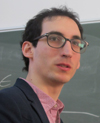 Josué Tonelli Cueto,
Josué Tonelli Cueto,
BMS Phase II Student,
Qualifying Exam BMS, MSc Technische Universität Berlin,
BSc University of the Basque Country
In the summer of 2013, I saw a BMS poster in the corner of a math department of some university in Madrid where I was at the time. At that moment, I just noted the program in a list of PhD programs to apply to and didn’t attach any more importance to it.
When the application period started, I saw that the BMS had a nice PhD program to apply to for the diversity of areas it had, the opportunity of choosing one’s own path, and the possible financial support it offered. So I applied. A few months later, I received an invitation to the BMS Days and the BMS Student Conference, where I had the opportunity of getting to know the BMS first hand. After one week of direct contact, I liked the nice relaxed environment at the BMS a lot. As a result, when I received my admissions letter, I accepted the offer with little hesitation.
Once my Bachelor and my summer break was over, I came to Berlin and started to walk my path at the BMS. The BMS Office was extremely helpful with all the bureaucracy that had to be done, such as the Anmeldung or enrolling at the university. With all the bureaucracy taken care of, it was a lot easier to focus on life and mathematics. Furthermore, the BMS offered a free German course, which was a useful way to be introduced to a language that was completely unknown to me at that point. The BMS students also gave us new students a great welcome through the Buddy Program or simply by hanging out with us at a variety of welcome events.
During my Phase I, I had the opportunity to take a great variety of courses in a diversity of areas, which gave me the ability to expand my mathematical knowledge and follow my mathematical interests. This was particularly useful, because during a course on algebraic complexity, I met Prof. Peter Bürgisser who would later become my master’s and PhD advisor. In addition, the mentor assigned to me by the BMS helped me decide which courses to take.
Parallel to this, I had the opportunity to use the credits gained during Phase I as credits for a master’s degree. In this process, the BMS Office was extremely helpful with the necessary bureaucracy when I had to transfer from the university I was initially enrolled at to the university I was going to do my master’s degree at. This saved me many of the usual headaches these processes generally entail.
Apart from the courses and the master’s, many other mathematical events took place, such as the BMS Friday where an invited speaker gives a talk about an interesting topic; the “What is…?” seminar in which students briefly explain a mathematical concept, idea or object; the soft-skills seminars where one can learn and practice other skills; and there was even a summer school on convex geometry. However (and luckily), not everything was about math and I was also able to enjoy a wide variety of social events in the company of other students, from the usual winter vacation party to playing pool, Laser Tag, ice skating, and more.
In addition to all of this, living in a city like Berlin means that one doesn’t run out of options to expend time during one’s free time. One can find activities and events for all preferences and tastes, which makes it possible to equally combine studying at the BMS with an active life through the streets of the city. For example, on free evenings, one can go to live jazz concerts at a bar, film events on Sunday, open discussions and so on.
After four semesters in Phase I, I did my Qualifying Exam (as a master’s Thesis defense) and then started Phase II. I have joined Prof. Felipe Cucker's Einstein Fellowship working group as a PhD student, and I’m doing my research under his and Prof. Bürgisser’s supervision. With this a new cycle begins, and with it more math, more experiences and more fun awaits me at the BMS and in Berlin!
Published in the end of February 2017






















